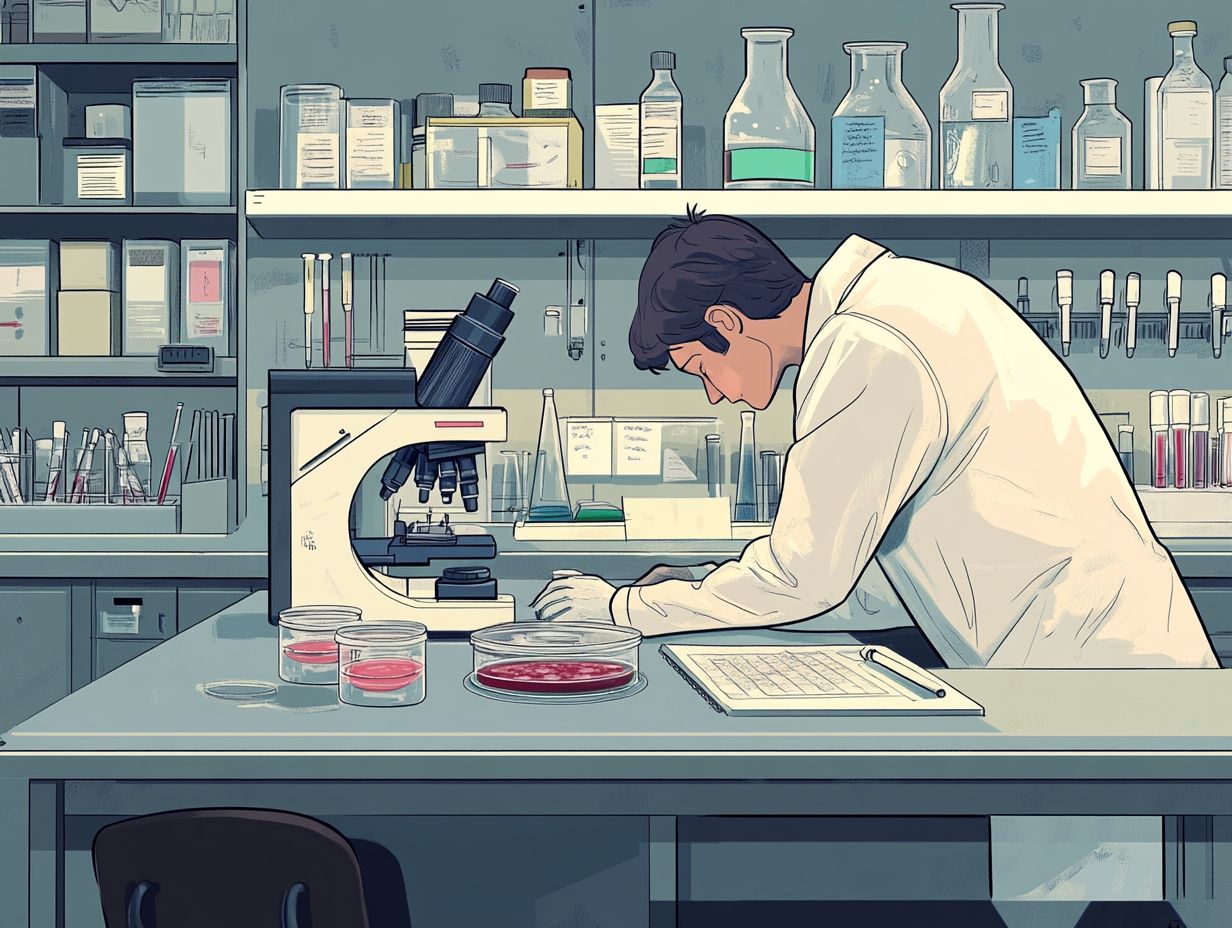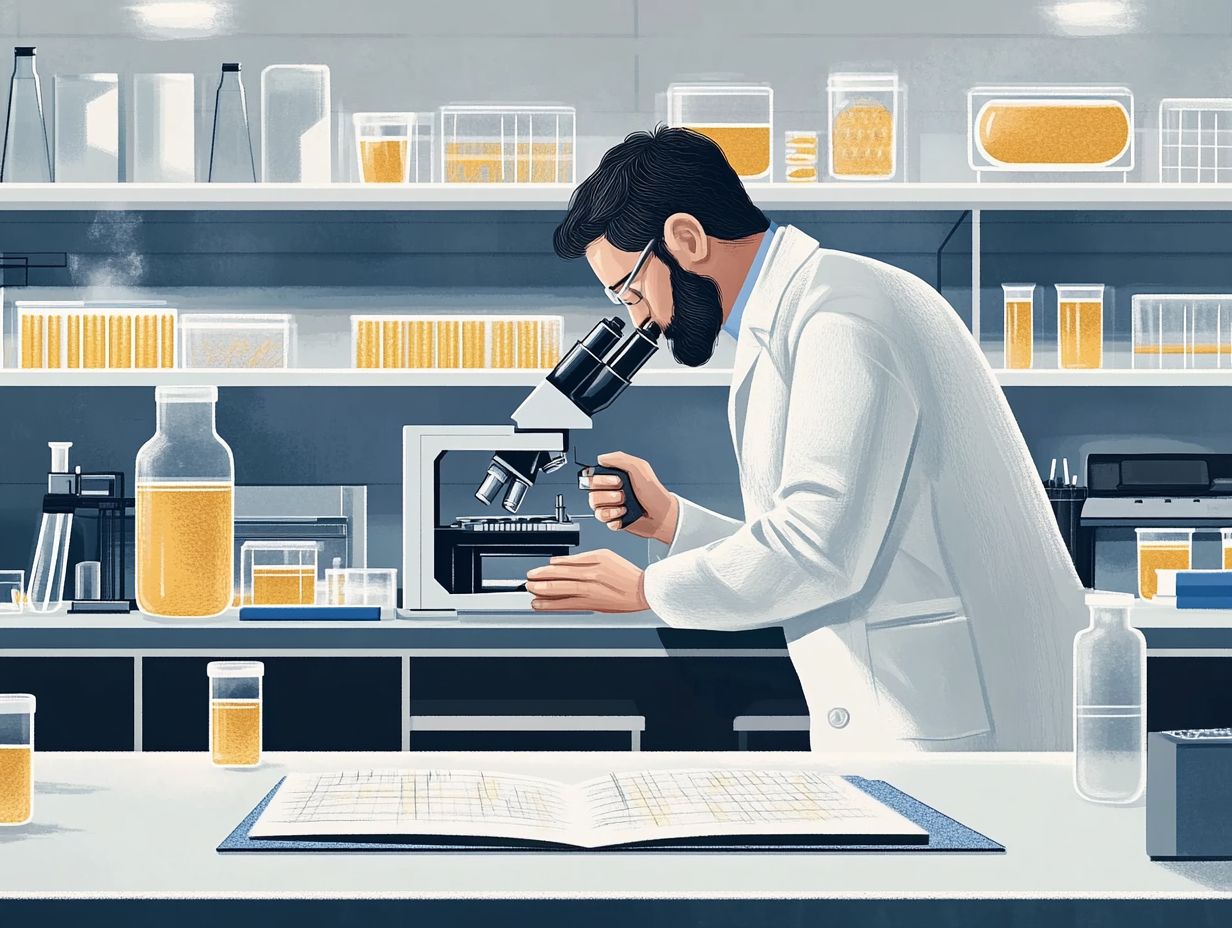Trade Secrets in the Biotech Sector
In the rapidly evolving world of biotechnology, trade secrets are essential for fostering innovation and maintaining a competitive edge.
This article delves into the various types of trade secrets unique to the biotech sector. It showcases their significance through compelling examples and practical applications. You ll discover critical legal and technological strategies necessary to protect these invaluable assets, as well as the common threats and breach scenarios the industry faces.
Recent controversies are explored, shedding light on how they shape the current landscape.
Emerging trends and predictions could redefine the role of trade secrets in biotech. Dive into the fascinating world of trade secrets and their vital importance to the future of biotechnology.
Contents
- Key Takeaways:
- Types of Trade Secrets in the Biotech Sector
- Protecting Trade Secrets in Biotech
- Common Threats to Trade Secrets in Biotech
- Recent Developments and Controversies
- Frequently Asked Questions
- What are trade secrets in the biotech sector?
- How do companies protect their trade secrets in the biotech sector?
- Why are trade secrets important in the biotech sector?
- What happens if a trade secret is stolen or disclosed?
- Are there any laws or regulations that protect trade secrets in the biotech sector?
- How can companies prevent employees from stealing or disclosing trade secrets?
Key Takeaways:

Trade secrets are valuable and confidential information that provide a competitive advantage in the biotech sector. In biotech, trade secrets in the tech industry include formulas, processes, and customer lists, which are protected through legal measures and technological safeguards. Breaches of trade secrets can occur through employee misconduct or cyber attacks, making it essential for biotech companies to have prevention strategies in place.
Defining Trade Secrets and Their Importance
Trade secrets represent valuable business information that grants you a competitive edge and economic value. Unlike patents, they include vital know-how, formulas, and processes kept under wraps, necessitating rigorous confidentiality measures to preserve their secrecy.
Protecting trade secrets is crucial across various industries, especially in biotechnology and life sciences. Innovative strategies can dramatically influence market positioning and profitability.
In biotechnology, trade secrets safeguard proprietary research, experimental data, and unique methodologies that pave the way for groundbreaking therapies and innovations. By maintaining confidentiality, you can effectively shield your discoveries from competitors, ensuring you fully capitalize on your research and development investments.
Legal frameworks, such as the Defend Trade Secrets Act (DTSA), establish a robust foundation for enforcing these protections. They provide recourse in instances where trade secrets are improperly disclosed or misappropriated.
As biotechnology advances, safeguarding trade secrets becomes increasingly essential for fostering innovation and maintaining a competitive advantage.
Types of Trade Secrets in the Biotech Sector
In biotech, trade secrets can take many forms, from proprietary knowledge about active ingredient formulations to unique research and development methodologies utilized by pharmaceutical giants.
These trade secrets are essential for maintaining competitive advantages and driving innovation within the industry.
Real-World Applications of Trade Secrets
In biotechnology, trade secrets encompass proprietary processes for drug formulation and innovative methods for synthesizing active ingredients. If these secrets are misappropriated or disclosed through theft, the financial repercussions for companies can be staggering.
Consider an infamous case involving a biotech firm that pioneered a life-saving drug using a novel method. Despite stringent confidentiality agreements, a key employee left for a competitor, taking sensitive information about the proprietary technique with them. This breach not only undermined the original company s market position but also reshaped the competitive landscape of the industry.
Such incidents highlight the limitations of employee agreements when not supported by robust security measures. The resulting financial fallout often leads companies to tread carefully, tightening their strategies and potentially stifling the very innovations that thrive on shared knowledge and collaboration.
In conclusion, protecting trade secrets is vital for the biotech industry’s future. Companies must implement effective strategies to safeguard their valuable information. Explore more about trade secrets and how you can protect yours in the biotech field.
Protecting Trade Secrets in Biotech

Protecting trade secrets in the biotech industry demands a smart mix of strategies. You ll need to blend strong legal measures, like non-disclosure agreements, with advanced technological expertise and security protocols.
This combination is essential for keeping sensitive information safe from unauthorized access or disclosure. It ensures your innovations remain secure and competitive.
Legal and Technological Measures
Legal measures for protecting trade secrets empower you to seek legal remedies through a federal cause of action, particularly under the Defend Trade Secrets Act (DTSA). This act provides a strong framework to fight against economic espionage and other breaches with precision.
The EU has also introduced the Trade Secrets Directive, designed to harmonize trade secret protections across member states. This allows you to pursue civil remedies for misappropriation more effectively.
Your legal remedies may include:
- Injunctions
- Damages
- Seizure of infringing goods
However, enforcement can pose significant challenges. Many businesses encounter obstacles like jurisdictional differences and the complex legal landscapes of various countries.
While the United States tends to favor a litigation-heavy approach, many international jurisdictions lean toward a more conciliatory strategy, emphasizing negotiation and mediation. This divergence complicates cross-border enforcement for companies striving to safeguard their proprietary information.
Common Threats to Trade Secrets in Biotech
In the biotech sector, you face significant threats to your trade secrets, particularly from trade secret theft and economic espionage, which is the theft of business secrets for commercial advantage. These risks loom large in a competitive landscape where misappropriation of proprietary knowledge can dramatically shift market dynamics.
Protecting your intellectual assets is not just a precaution; it s crucial to protect your edge in the market!
Possible Breach Scenarios and Prevention Strategies
Breach scenarios for trade secrets in biotech often stem from improper practices due to employee negligence or malicious intent. This underscores the importance of implementing stringent confidentiality measures and effective harm mitigation strategies.
Consider this: an employee might inadvertently divulge sensitive research data during an offhand conversation in a crowded caf , exposing the company to considerable competitive risks. Breaches can also occur when internal systems lack adequate security, granting unauthorized individuals access to proprietary information.
To address these vulnerabilities, it’s crucial for biotech firms to invest in comprehensive employee training programs that stress the significance of protecting sensitive data. Having well-crafted employee agreements that clearly define confidentiality expectations is essential.
Furthermore, integrating advanced security measures such as encrypted communications and strict access controls can enhance the protection of critical information from potential threats. This not only safeguards your innovative efforts but also fosters a culture of security awareness among all staff members.
Recent Developments and Controversies

Recent developments regarding trade secret protection, particularly the Trade Secrets Directive enacted in EU Member States, have sparked debates and shown how tough it is to fight against economic espionage in the biotech sector.
Implications for the Biotech Industry
The implications of recent trade secret developments are profound for the biotech industry, which influence your intellectual property portfolio and ability to maintain a competitive edge amid increasing enforcement challenges.
You need to reevaluate how your firm approaches innovation. This is crucial for your market positioning. With increased oversight and varied enforcement mechanisms at play, adopting proactive strategies to protect your proprietary information has become essential.
This shift involves investing in strong compliance programs and cultivating a culture of secrecy around research and development. As you navigate this complex landscape, consider forming collaborations and partnerships that can enhance your resource base while mitigating associated risks.
By adapting your frameworks to address these legislative changes, you can better leverage your innovative capabilities and ultimately secure a stronger foothold in the market.
Future Outlook for Trade Secrets in Biotech
The future of trade secrets in the biotech sector presents a landscape rich with evolving trends and insights.
As you navigate the complexities of trade secret protection, you will encounter escalating challenges driven by rapid technological advancements and shifting market demands.
Trends and Predictions
Trends in the biotech sector reveal a growing emphasis on robust innovation strategies and comprehensive legal frameworks designed to protect trade secrets and proprietary knowledge.
As you navigate an increasingly competitive market, implementing effective organizational measures becomes imperative. With ongoing advancements in technology, you should consider adopting enhanced cybersecurity protocols to safeguard sensitive information from unauthorized access.
Emerging legal enhancements, such as more stringent regulations and clearer definitions surrounding trade secrets, provide you with improved tools for enforcement and dispute resolution.
By capitalizing on these developments, you can establish a more resilient infrastructure for your proprietary assets, thereby fortifying your competitive edge while fostering a culture of innovation and trust among your stakeholders.
Frequently Asked Questions

What are trade secrets in the biotech sector?
Trade secrets in the biotech sector refer to confidential information that gives a company a competitive advantage. This information is kept secret from the public and could include formulas, processes, techniques, or trade secrets in the food industry or other proprietary information related to biotechnology.
How do companies protect their trade secrets in the biotech sector?
Companies in the biotech sector use a variety of measures to protect their trade secrets. These measures include non-disclosure agreements, restricted access to sensitive information, and security measures to prevent theft or unauthorized access.
Why are trade secrets important in the biotech sector?
Trade secrets are important in the biotech sector because they can provide companies with a competitive edge and contribute to their success in the market. In a highly competitive industry like biotechnology, understanding trade secrets in the pharmaceutical industry can be crucial for a company’s survival and growth.
What happens if a trade secret is stolen or disclosed?
If a trade secret is stolen or disclosed without authorization, the owner of the trade secret can take legal action against the party responsible. This action could result in financial damages, injunctions to prevent further disclosure, and even criminal charges in some cases.
Are there any laws or regulations that protect trade secrets in the biotech sector?
Yes, there are laws and regulations in place to protect trade secrets in the biotech sector. These include the Uniform Trade Secrets Act, the Economic Espionage Act, and the Defend Trade Secrets Act, among others.
How can companies prevent employees from stealing or disclosing trade secrets?
Companies can prevent employees from stealing or disclosing trade secrets by implementing strict confidentiality policies, providing regular training on trade secrets and their importance, and conducting thorough background checks on potential employees before hiring them.






